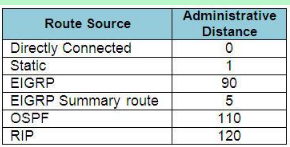READ Free Dumps For CISCO- 100-105
| Question ID 14526 | A router has learned three possible routes that could be used to reach a destination
network. One route is from EIGRP and has a composite metric of 20514560. Another route
is from OSPF with a metric of 782. The last is from RIPv2 and has a metric of 4. Which
route or routes will the router install in the routing table?
|
| Option A | the OSPF route
|
| Option B | the EIGRP route
|
| Option C | the RIPv2 route
|
| Option D | all three routes
|
| Option E | the OSPF and RIPv2 routes
|
| Option F | Answer : B
Explanation: When one route is advertised by more than one routing protocol, the router will choose to use the routing protocol which has lowest Administrative Distance. The Administrative Distances of popular routing protocols are listed below:

|
| Correct Answer | B |
Explanation
| Question ID 14527 | What does administrative distance refer to?
|
| Option A | the cost of a link between two neighboring routers
|
| Option B | the advertised cost to reach a network
|
| Option C | the cost to reach a network that is administratively set
|
| Option D | a measure of the trustworthiness of a routing information source
|
| Correct Answer | D |
Explanation Reference: http://www.cisco.com/en/US/tech/tk365/technologies_tech_note09186a0080094195.shtml Administrative distance is the feature that routers use in order to select the best path when there are two or more different routes to the same destination from two different routing protocols. Administrative distance defines the reliability of a routing protocol. Each routing protocol is prioritized in order of most to least reliable (believable) with the help of an administrative distance value. Administrative distance is the first criterion that a router uses to determine which routing protocol to use if two protocols provide route information for the same destination. Administrative distance is a measure of the trustworthiness of the source of the routing information. The smaller the administrative distance value, the more reliable the protocol.